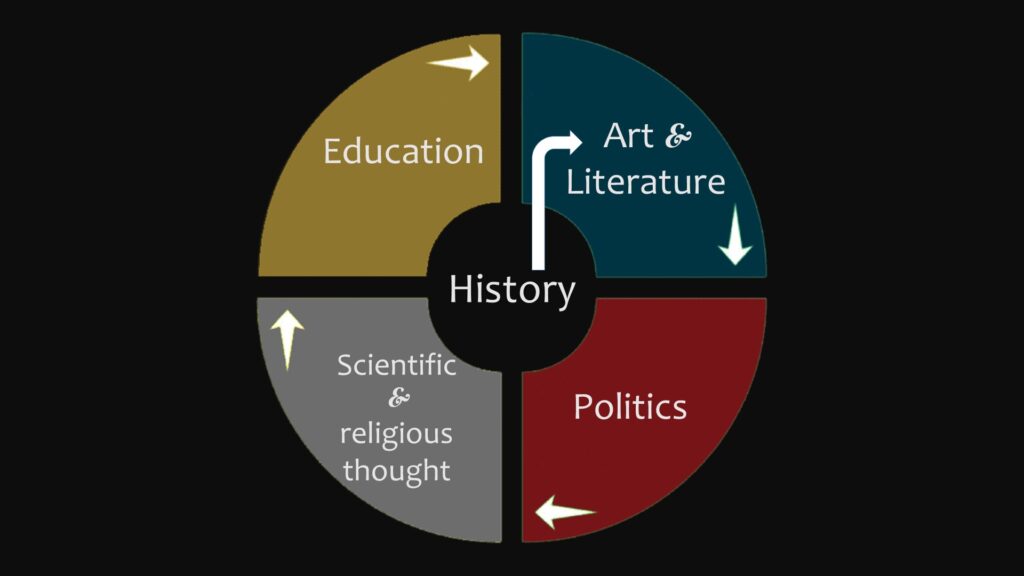Central to our approach is an organic model of social sciences. We believe, that:
- History is a series of goals collectively adopted and achieved by humanity.
- The goal adopted by a people or by humanity at any given time is idealized by the uniform literature (whereas high or popular literature idealizes the goals of particular individuals). The same can be said about art.
- Once a goal has been absorbed, it is realized through politics. The most successful politicians are those who attempt to realize the goals represented by the uniform culture of a society.
- Consequently, changes occur in the society. Religious thought (and also the scientific thought to some extent) evaluates those changes.
- The substance of the above process is passed on to the next generation through education (and hence, most of the current practices carried out in the name of education are not education in this sense).

The following videos (originally prepared as learning resources for our online courses, present the beginners-level information about the above-mentioned disciplines with special focus on Pakistan.
How Jinnah Liberated India
The video is also available in twenty-seven episodes contained in a playlist.
The book as well as the online lessons presented in these videos show that humanity is passing through an emergent phase in its evolution, the end of which is that the nations should be able to organize themselves without needing to be controlled by empires, and people within a nation should be able to organize themselves without needing governments as known at present.
Quaid-i-Azam Muhammad Ali Jinnah played a pivotal role in this evolution by perfecting the method that could achieve both of the purposes mentioned above, and by using the same method for liberating the Indian Sub-Continent in such a manner that the British Empire got transformed into a true Commonwealth.
The stages of this process of evolution from the perspectives of, respectively, the British Commonwealth, the South Asian Muslims, and the South Asian non-Muslims, are as follows.
| Stage | British | Muslims | Non-Muslims |
|---|---|---|---|
| 1887-1906 | Decision to have regular imperial conferences | Foundation of All-India Muslim League | Demand for dominion status for India |
| 1907-1926 | Balfour Declaration of 1926 | Election of 1926 in India | Election of 1926 in India |
| 1927-1946 | Delhi Resolution of All-India Muslim League | Delhi Resolution of All-India Muslim League | Delhi Resolution of All-India Muslim League |
| 1947-1966 | Tashkent Agreement between India and Pakistan | Tashkent Agreement between India and Pakistan | Tashkent Agreement between India and Pakistan |
| 1967-1986 | SAARC | SAARC | SAARC |
| 1987-2006 | Afghanistan Compact | Afghanistan Compact | Afghanistan Compact |
| 2007-2026 | ? | ? | ? |
Jinnah’s Pakistan up to 2026
The video is also available with English subtitles in eleven episodes contained in a playlist.
The first three stages of the contemporary evolution, i.e., 1887 to 1947, have been covered in detail in the previous book (How Jinnah Liberated India) and the online lessons about it (mentioned above). The next four stages, i.e., 1947 to 2026, are detailed in this video.
Simorgh: Mysteries of the Muslim Renaissance
The video is also available with English subtitles in eleven episodes contained in a playlist.
In each of the above-mentioned seven stages, the author most popular among the people of Pakistan (or the Muslims of the Indian Subcontinent in the first three stages), invariably becomes a channel for conveying to use the voice of the collective ego. The authors are:
| Stage | Author |
|---|---|
| 1887-1906 | Sir Syed Ahmad Khan |
| 1907-1926 | Maulana Muhammad Ali Jauhar |
| 1927-1946 | Allama Dr Sir Muhammad Iqbal |
| 1947-1966 | Ibne Safi |
| 1967-1986 | Waheed Murad |
| 1987-2006 | Mustansar Husain Tarrar |
| 2007-2026 | Everybody (“Simorgh”) |
Ten Political Principles of Jinnah
The video is also available with English subtitles in twelve episodes contained in a playlist.
1. Achieve your acclaimed goal.
2. Pursue common goals.
3. Seek the common will and follow it.
4. Have a national organization.
5. Sovereignty de jure belongs to God.
6. Sovereignty de facto resides in the people.
7. State is a contractual organism.
8. Our ideal principles are solidarity, equality and liberty.
9. Remove want and fear of all types.
10. Reject caste system in all its forms.
The Philosophy of Iqbal in Nine Simple Points
The video is also available with English subtitles in ten episodes contained in a playlist.
1. The essential nature of human being consists in will.
2. The ethical nature of human being is good.
3. All the principal forms of vice can be reduced to fear.
4. Absolute freedom from fear and grief is possible.
5. Islam and the modern Western civilization share a common worldview.
6. Faith is the basis and the first of the three components of the Muslim community.
7. Uniform Culture is the second component of the Muslim community, and should internally transform the individual.
8. Common institutions of law and government are the third component of the Muslim community, and should externally transform the individual.
9. We should perpetuate a type of character, which holds fast to its own while assimilating all that is good in others.
Conscious Evolution: Education for the Future
The video is also available with English subtitles in five episodes contained in a playlist.
We have achieved Marghdeen (an ideal world free from want and fear) but we are not receiving its benefits because we lack the education required for the citizenship of Marghdeen. A citizen of Marghdeen needs to be capable of foreseeing the destiny of the nation as well as his or her individual role in achieving that destiny. A foundation for such an education has been laid in the courses and videos listed above. Next, our intermediate-level courses are aimed at developing these skills further.